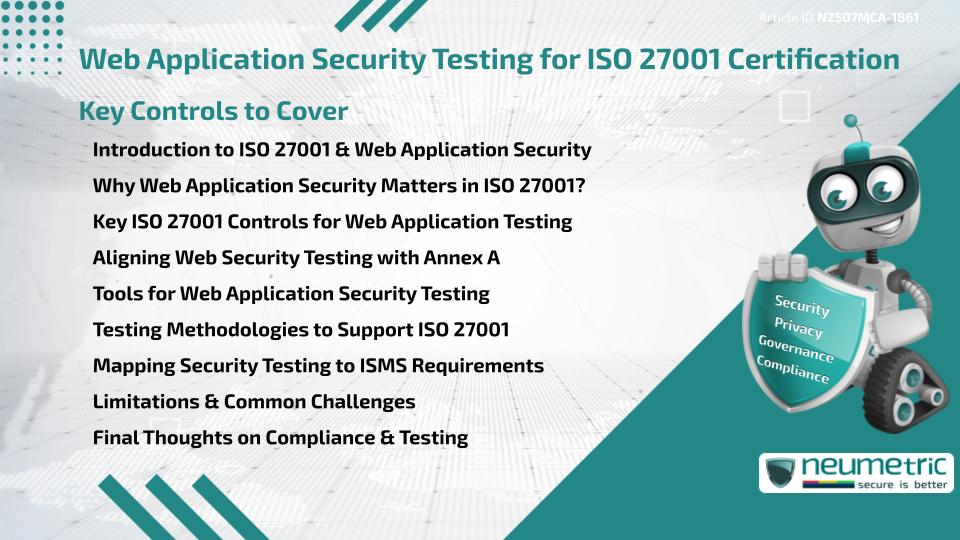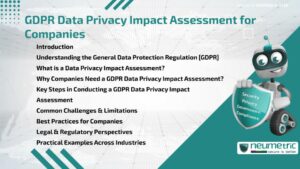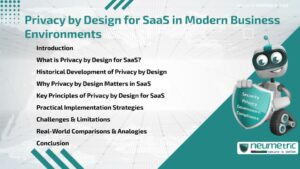Table of Contents
ToggleIntroduction to ISO 27001 & Web Application Security
ISO 27001 is a globally accepted Framework for establishing an Information Security Management System [ISMS]. For Organisations running Web Applications, Security Testing becomes a fundamental requirement. Conducting Web Application Security Testing for ISO 27001 Certification ensures that potential Vulnerabilities are Identified & Remediated in line with Compliance Standards.
Why Web Application Security Matters in ISO 27001?
Web Applications are often exposed to Public Networks & Handle Sensitive User or Company Data. Testing them helps verify Confidentiality, Integrity & Availability, Core Principles of ISO 27001. Without Web Application Security Testing for ISO 27001 Certification, Organisations Risk Audit Failures or Data Breaches.
Key ISO 27001 Controls for Web Application Testing
Several ISO 27001 Annex A Controls directly align with Web Application Testing. Important ones include:
- A.12.6.1: Management of Technical Vulnerabilities
- A.14.2.5: Secure System Engineering Principles
- A.18.1.4: Privacy & Protection of Personally Identifiable Information
These Controls require Businesses to Test, Document & Fix Vulnerabilities in their Application Stack.
Aligning Web Security Testing with Annex A
Web Application Security Testing for ISO 27001 Certification should Map to Controls in Annex A. For Example, Static Analysis Tools can support A.14.2.1 (Secure Development Policy), while dynamic Testing can address A.12.6.1 by finding live Vulnerabilities.
Tools for Web Application Security Testing
Commonly used Tools include:
- OWASP ZAP
- Burp Suite
- Nikto
- Nmap
- Wapiti
These Tools assist in Automating parts of the Testing Process to meet Compliance Goals.
Testing Methodologies to Support ISO 27001
A Structured approach like OWASP Testing Guide or the NIST CyberSecurity Framework can enhance the effectiveness of Web Application Security Testing for ISO 27001 Certification. These provide Test Case examples that align with Audit-ready Documentation.
Mapping Security Testing to ISMS Requirements
Security Testing efforts must feed into the broader ISMS. Testing Results should be reviewed during Risk Assessments & Management Reviews. Regular Re-testing ensures the Control environment remains current & robust.
Limitations & Common Challenges
Even with Tools & Frameworks, some Vulnerabilities are complex to detect. Authentication issues, Logic flaws or Third Party dependencies may require manual Testing. Documentation gaps can also hinder Audit alignment.
Final Thoughts on Compliance & Testing
By integrating Web Application Security Testing for ISO 27001 Certification into routine Development & Maintenance cycles, Organisations reduce Risk & improve Audit Readiness. Testing should be both Preventative & Detective in nature.
Takeaways
- ISO 27001 requires aligning Web Application Security with ISMS Controls
- Testing should be mapped to Annex A Controls like A.12.6.1 & A.14.2.5
- Use a combination of Manual & Automated Tools
- Document results clearly for Audits
- Retest regularly to maintain Control effectiveness
FAQ
What is the Role of Web Application Security in ISO 27001 Certification?
It ensures Technical Vulnerabilities are managed in accordance with Annex A Controls & ISMS Goals.
How often should Security Testing be Performed?
Ideally, Testing should be conducted Quarterly or After any major Code or Infrastructure change.
Are Automated Tools enough for ISO 27001 Compliance?
No, Manual Testing is also essential to detect Logic-based & Complex Vulnerabilities.
Which ISO 27001 Controls are related to Web Application Testing?
Controls such as A.12.6.1, A.14.2.1 & A.14.2.5 are most relevant.
How does Security Testing support the ISMS?
Testing provides input for Risk Assessments, informs Treatment Plans & Strengthens Continuous Improvement.
References
- OWASP Testing Guide
- ISO 27001 Annex A Overview
- NIST CyberSecurity Framework
- ISO 27001 Controls Explained
- Understanding ISMS
Need help?
Neumetric provides organisations the necessary help to achieve their CyberSecurity, Compliance, Governance, Privacy, Certifications & PenTesting goals.
Organisations & Businesses, specifically those which provide SaaS & AI Solutions, usually need a CyberSecurity Partner for meeting & maintaining the ongoing Security & Privacy needs & requirements of their Clients & Customers.
SOC 2, ISO 27001, ISO 42001, NIST, HIPAA, HECVAT, EU GDPR are some of the Frameworks that are served by Fusion – a centralised, automated, AI-enabled SaaS Solution created & managed by Neumetric.
Reach out to us!





